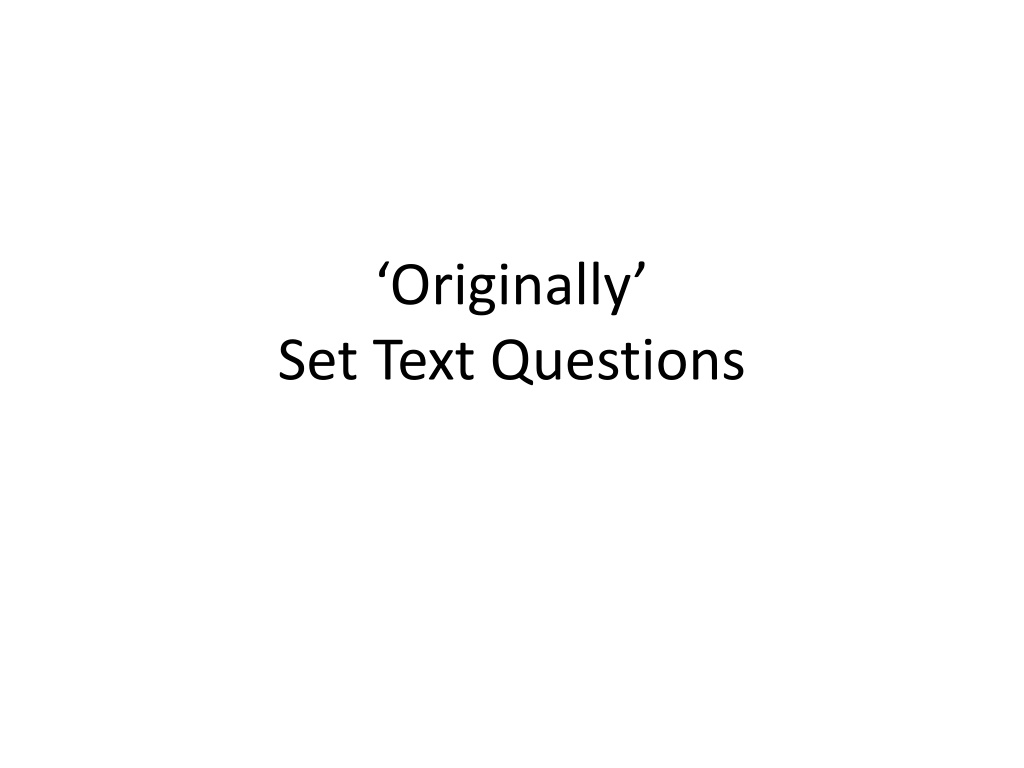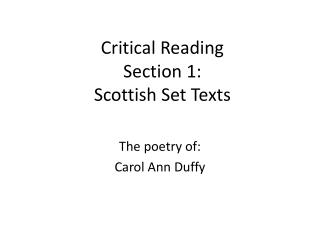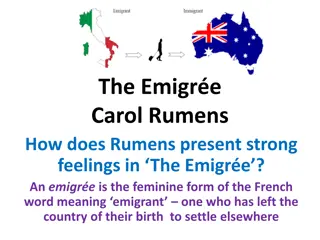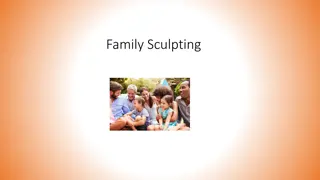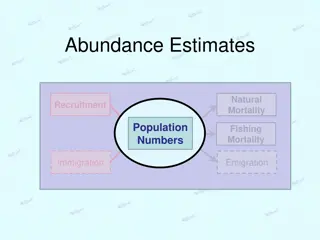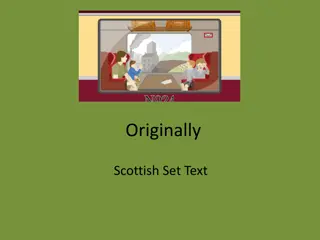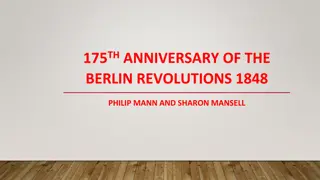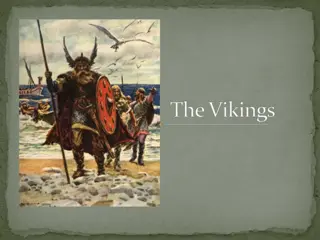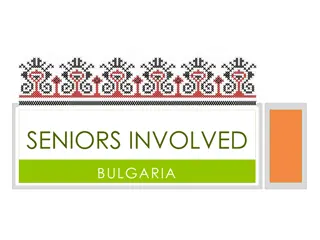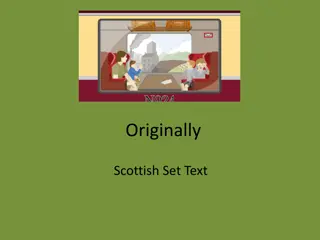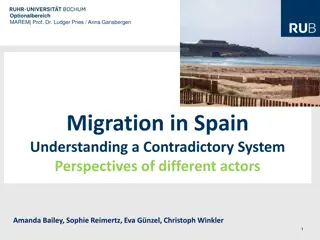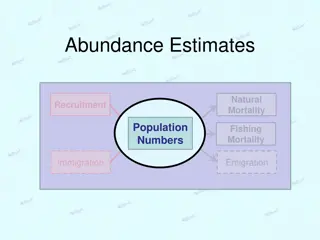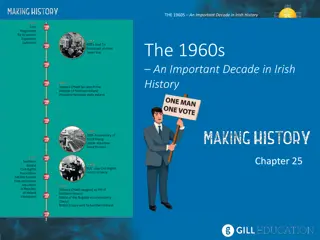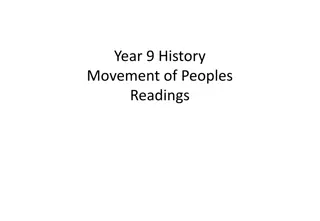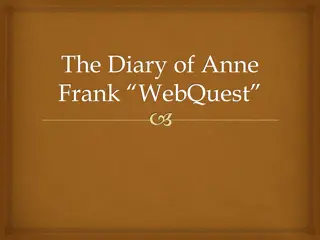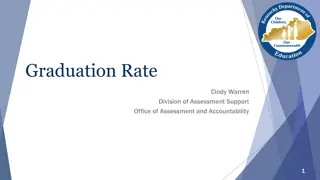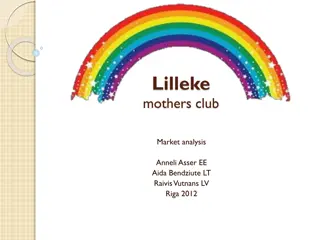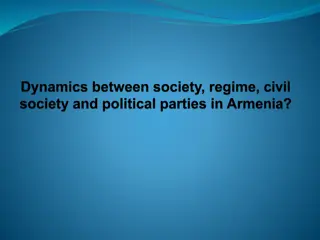Exploring the Impact of Emigration on Family in 'Originally'
The poem "Originally" by Carol Ann Duffy delves into the emotional turmoil experienced by a family as they move to a new country. Through vivid imagery and poignant descriptions, the poet captures the feelings of displacement, loss, and longing for the familiar. The poem reflects on the challenges of adapting to a new environment and the sense of identity crisis that arises from such a significant change.
Uploaded on Sep 25, 2024 | 0 Views
Download Presentation

Please find below an Image/Link to download the presentation.
The content on the website is provided AS IS for your information and personal use only. It may not be sold, licensed, or shared on other websites without obtaining consent from the author. Download presentation by click this link. If you encounter any issues during the download, it is possible that the publisher has removed the file from their server.
E N D
Presentation Transcript
Originally Set Text Questions
Originally We came from our own country in a red room which fell through the fields, our mother singing our father s name to the turn of the wheels. My brothers cried, one of them bawling, Home, 5 Home, as the miles rushed back to the city, the street, the house, the vacant rooms where we didn t live any more. I stared at the eyes of a blind toy, holding its paw.
All childhood is an emigration. Some are slow, 10 leaving you standing, resigned, up an avenue where no one you know stays. Others are sudden. Your accent wrong. Corners, which seem familiar, leading to unimagined pebble-dashed estates, big boys eating worms and shouting words you don t understand. 15 My parents anxiety stirred like a loose tooth in my head. I want our own country, I said.
But then you forget, or dont recall, or change, and, seeing your brother swallow a slug, feel only a skelf of shame. I remember my tongue 20 shedding its skin like a snake, my voice in the classroom sounding just like the rest. Do I only think I lost a river, culture, speech, sense of first space and the right place? Now, Where do you come from? strangers ask. Originally? And I hesitate.
Questions 1. By referring closely to stanza 1 analyse the use of poetic technique to emphasise the dramatic impact moving to another country had on the family. 2 2. Look at stanza 2. All childhood is an emigration Explain fully what the poet means by this. 2 3. In lines 12 16 analyse the use of poetic technique to convey the distress of the family members caused by their sudden emigration to a new environment. 3 4. Evaluate the effectiveness of stanza 3 as a conclusion to the poem. Your answer should deal with ideas and/or language. 3 5. Discuss how Carol Ann Duffy uses contrast in this poem and at least one other to highlight the poems main concerns. 10
Originally 1. By referring closely to stanza 1 analyse the use of poetic technique to emphasise the dramatic impact moving to another country had on the family. 2 We came from our own country in a red room which fell through the fields, our mother singing our father s name to the turn of the wheels. My brothers cried, one of them bawling, Home, Home, as the miles rushed back to the city, the street, the house, the vacant rooms where we didn t live any more. I stared at the eyes of a blind toy, holding its paw. 2 marks can be awarded for two examples which highlight the dramatic impact. A detailed / insightful comment on one example may be awarded 2 marks. Reference plus basic comment for 1 mark. 0 marks for reference / quotation alone.
Originally 1. By referring closely to stanza 1 analyse the use of poetic technique to emphasise the dramatic impact moving to another country had on the family. 2 We came from our own country in a red room which fell through the fields, our mother singing our father s name to the turn of the wheels. My brothers cried, one of them bawling, Home, Home, as the miles rushed back to the city, the street, the house, the vacant rooms where we didn t live any more. I stared at the eyes of a blind toy, holding its paw. Possible answers include: Word choice of we / our suggests a sense of comforting group identity / defining event in family history Repetition of our suggests the need for group identity in the face of new circumstances
Originally 1. By referring closely to stanza 1 analyse the use of poetic technique to emphasise the dramatic impact moving to another country had on the family. 2 We came from our own country in a red room which fell through the fields, our mother singing our father s name to the turn of the wheels. My brothers cried, one of them bawling, Home, Home, as the miles rushed back to the city, the street, the house, the vacant rooms where we didn t live any more. I stared at the eyes of a blind toy, holding its paw. Possible answers include: Word choice of fell suggests a loss of control over event / helplessness in the face of change Word choice of cried / bawling suggests the degree of distress caused by the move.
Originally 1. By referring closely to stanza 1 analyse the use of poetic technique to emphasise the dramatic impact moving to another country had on the family. 2 We came from our own country in a red room which fell through the fields, our mother singing our father s name to the turn of the wheels. My brothers cried, one of them bawling, Home, Home, as the miles rushed back to the city, the street, the house, the vacant rooms where we didn t live any more. I stared at the eyes of a blind toy, holding its paw. Possible answers include: The sequence the city . rooms suggests a poignant re-tracing of the route / desire to return
Originally 1. By referring closely to stanza 1 analyse the use of poetic technique to emphasise the dramatic impact moving to another country had on the family. 2 We came from our own country in a red room which fell through the fields, our mother singing our father s name to the turn of the wheels. My brothers cried, one of them bawling, Home, Home, as the miles rushed back to the city, the street, the house, the vacant rooms where we didn t live any more. I stared at the eyes of a blind toy, holding its paw. Possible answers include: The sequence the city . rooms suggests a poignant re-tracing of the route / desire to return Word choice of vacant suggests the physical / emotional emptiness of the place that used to be home
Originally 1. By referring closely to stanza 1 analyse the use of poetic technique to emphasise the dramatic impact moving to another country had on the family. 2 We came from our own country in a red room which fell through the fields, our mother singing our father s name to the turn of the wheels. My brothers cried, one of them bawling, Home, Home, as the miles rushed back to the city, the street, the house, the vacant rooms where we didn t live any more. I stared at the eyes of a blind toy, holding its paw. Possible answers include: The climactic conclusion to the sequence city any more. suggests the finality of the move
Originally 1. By referring closely to stanza 1 analyse the use of poetic technique to emphasise the dramatic impact moving to another country had on the family. 2 We came from our own country in a red room which fell through the fields, our mother singing our father s name to the turn of the wheels. My brothers cried, one of them bawling, Home, Home, as the miles rushed back to the city, the street, the house, the vacant rooms where we didn t live any more. I stared at the eyes of a blind toy, holding its paw. Possible answers include: The climactic conclusion to the sequence city any more. suggests the finality of the move The word choice of stared suggests a stunned reaction to the move.
Originally 1. By referring closely to stanza 1 analyse the use of poetic technique to emphasise the dramatic impact moving to another country had on the family. 2 We came from our own country in a red room which fell through the fields, our mother singing our father s name to the turn of the wheels. My brothers cried, one of them bawling, Home, Home, as the miles rushed back to the city, the street, the house, the vacant rooms where we didn t live any more. I stared at the eyes of a blind toy, holding its paw. Possible answers include: The contrast of the poet s reaction stared with the reactions of her brothers cried / bawling highlights the poet s shocked reaction
Originally 1. By referring closely to stanza 1 analyse the use of poetic technique to emphasise the dramatic impact moving to another country had on the family. 2 We came from our own country in a red room which fell through the fields, our mother singing our father s name to the turn of the wheels. My brothers cried, one of them bawling, Home, Home, as the miles rushed back to the city, the street, the house, the vacant rooms where we didn t live any more. I stared at the eyes of a blind toy, holding its paw. Possible answers include: Symbolic use of blind toy like the poet the toy is unfeeling and unaware of what is happening Word choice of holding its paw suggests a desperate need for comfort / reassurance
All childhood is an emigration. Some are slow, leaving you standing, resigned, up an avenue where no one you know stays. Others are sudden. Your accent wrong. Corners, which seem familiar, leading to unimagined pebble-dashed estates, big boys eating worms and shouting words you don t understand. My parents anxiety stirred like a loose tooth in my head. I want our own country, I said. 2. Look at stanza 2. Explain fully what the poet means by this. 2 Candidates should explain fully what Duffy means by the image all childhood is an emigration. Simple comment about journey to adulthood for 1 mark. A detailed / insightful comment may be awarded 2 marks. Reference to journey alone = 0 marks. All childhood is an emigration
All childhood is an emigration. Some are slow, leaving you standing, resigned, up an avenue where no one you know stays. Others are sudden. Your accent wrong. Corners, which seem familiar, leading to unimagined pebble-dashed estates, big boys eating worms and shouting words you don t understand. My parents anxiety stirred like a loose tooth in my head. I want our own country, I said. 2. Look at stanza 2. Explain fully what the poet means by this. 2 Possible answers include: Childhood is a journey from safety / security / the familiar Childhood is a journey into the unknown / to independence / potentially risky and dangerous situations. All childhood is an emigration OR
Your accent wrong. Corners, which seem familiar, leading to unimagined pebble-dashed estates, big boys eating worms and shouting words you don t understand. My parents anxiety stirred like a loose tooth in my head. I want our own country, I said. 3. In lines 12 16 analyse the use of poetic technique to convey the distress of the family members caused by their sudden emigration to a new environment. 3 Candidates should analyse how the poet s use of poetic technique conveys the distress of the family members. 3 marks can be awarded for three examples of language highlighting the distress. Reference plus basic comment for 1 mark. (1+1+1). Alternatively, 2 marks may be awarded for reference plus more detailed / insightful comment (2+1). 0 marks for reference / quotation alone.
Your accent wrong. Corners, which seem familiar, leading to unimagined pebble-dashed estates, big boys eating worms and shouting words you don t understand. My parents anxiety stirred like a loose tooth in my head. I want our own country, I said. 3. In lines 12 16 analyse the use of poetic technique to convey the distress of the family members caused by their sudden emigration to a new environment. 3 Possible answers include: The positioning / abruptness of the minor sentence Your accent wrong suggests lack of acceptance / sense of exclusion.
Your accent wrong. Corners, which seem familiar, leading to unimagined pebble-dashed estates, big boys eating worms and shouting words you don t understand. My parents anxiety stirred like a loose tooth in my head. I want our own country, I said. 3. In lines 12 16 analyse the use of poetic technique to convey the distress of the family members caused by their sudden emigration to a new environment. 3 Possible answers include: The parenthesis / positioning of which seem familiar suggest a sense of confusion / disorientation / d j vu triggered by the new environment.
Your accent wrong. Corners, which seem familiar, leading to unimagined pebble-dashed estates, big boys eating worms and shouting words you don t understand. My parents anxiety stirred like a loose tooth in my head. I want our own country, I said. 3. In lines 12 16 analyse the use of poetic technique to convey the distress of the family members caused by their sudden emigration to a new environment. 3 Possible answers include: The word choice of unimagined suggests some unspeakable horror.
Your accent wrong. Corners, which seem familiar, leading to unimagined pebble-dashed estates, big boys eating worms and shouting words you don t understand. My parents anxiety stirred like a loose tooth in my head. I want our own country, I said. 3. In lines 12 16 analyse the use of poetic technique to convey the distress of the family members caused by their sudden emigration to a new environment. 3 Possible answers include: The word choice of big boys suggests the intimidating appearance of the boys/the vulnerability of the poet.
Your accent wrong. Corners, which seem familiar, leading to unimagined pebble-dashed estates, big boys eating worms and shouting words you don t understand. My parents anxiety stirred like a loose tooth in my head. I want our own country, I said. 3. In lines 12 16 analyse the use of poetic technique to convey the distress of the family members caused by their sudden emigration to a new environment. 3 Possible answers include: The detail eating worms suggests outlandish / disgusting behaviour.
Your accent wrong. Corners, which seem familiar, leading to unimagined pebble-dashed estates, big boys eating worms and shouting words you don t understand. My parents anxiety stirred like a loose tooth in my head. I want our own country, I said. 3. In lines 12 16 analyse the use of poetic technique to convey the distress of the family members caused by their sudden emigration to a new environment. 3 Possible answers include: The word choice of shouting suggests the intimidating nature of the way the boys are speaking.
Your accent wrong. Corners, which seem familiar, leading to unimagined pebble-dashed estates, big boys eating worms and shouting words you don t understand. My parents anxiety stirred like a loose tooth in my head. I want our own country, I said. 3. In lines 12 16 analyse the use of poetic technique to convey the distress of the family members caused by their sudden emigration to a new environment. 3 Possible answers include: The word choice of you don t understand suggests confusion / alienation.
Your accent wrong. Corners, which seem familiar, leading to unimagined pebble-dashed estates, big boys eating worms and shouting words you don t understand. My parents anxiety stirred like a loose tooth in my head. I want our own country, I said. 3. In lines 12 16 analyse the use of poetic technique to convey the distress of the family members caused by their sudden emigration to a new environment. 3 Possible answers include: The image anxiety loose tooth suggests that a loose tooth causes annoyance but the parents concerns about the move won t go away.
Your accent wrong. Corners, which seem familiar, leading to unimagined pebble-dashed estates, big boys eating worms and shouting words you don t understand. My parents anxiety stirred like a loose tooth in my head. I want our own country, I said. 3. In lines 12 16 analyse the use of poetic technique to convey the distress of the family members caused by their sudden emigration to a new environment. 3 Possible answers include: The word choice of in my head suggests that the parents concerns have made a deep impression on the poet.
Your accent wrong. Corners, which seem familiar, leading to unimagined pebble-dashed estates, big boys eating worms and shouting words you don t understand. My parents anxiety stirred like a loose tooth in my head. I want our own country, I said. 3. In lines 12 16 analyse the use of poetic technique to convey the distress of the family members caused by their sudden emigration to a new environment. 3 Possible answers include: The italics / the phrase I want country suggests the strength of the desire to return.
Your accent wrong. Corners, which seem familiar, leading to unimagined pebble-dashed estates, big boys eating worms and shouting words you don t understand. My parents anxiety stirred like a loose tooth in my head. I want our own country, I said. 3. In lines 12 16 analyse the use of poetic technique to convey the distress of the family members caused by their sudden emigration to a new environment. 3 Possible answers include: The word choice of want / our / own suggests the depth of her desire for the familiar.
But then you forget, or dont recall, or change, and, seeing your brother swallow a slug, feel only a skelf of shame. I remember my tongue shedding its skin like a snake, my voice in the classroom sounding just like the rest. Do I only think I lost a river, culture, speech, sense of first space and the right place? Now, Where do you come from? strangers ask. Originally? And I hesitate. 4. Evaluate the effectiveness of stanza 3 as a conclusion to the poem. Your answer should deal with ideas and/or language. 3 Candidates should show understanding of the term conclusion and show how the content of the last stanza continues or contrasts with ideas and / or language from the first two stanzas. 3 marks can be awarded for three appropriate, basic comments. A detailed / insightful comment on one example may be awarded 2 marks. Other examples are acceptable. 0 marks for reference / quotation alone.
But then you forget, or dont recall, or change, and, seeing your brother swallow a slug, feel only a skelf of shame. I remember my tongue shedding its skin like a snake, my voice in the classroom sounding just like the rest. Do I only think I lost a river, culture, speech, sense of first space and the right place? Now, Where do you come from? strangers ask. Originally? And I hesitate. 4. Evaluate the effectiveness of stanza 3 as a conclusion to the poem. Your answer should deal with ideas and/or language. 3 Possible answers include: Ideas The poet has moved on in her life, and she has adapted to her new life This move has created a sense of uncertainty as to her true origins, and sense of belonging
But then you forget, or dont recall, or change, and, seeing your brother swallow a slug, feel only a skelf of shame. I remember my tongue shedding its skin like a snake, my voice in the classroom sounding just like the rest. Do I only think I lost a river, culture, speech, sense of first space and the right place? Now, Where do you come from? strangers ask. Originally? And I hesitate. 4. Evaluate the effectiveness of stanza 3 as a conclusion to the poem. Your answer should deal with ideas and/or language. 3 Possible answers include: Language But suggests a change from her previous outsider status to becoming assimilated into the new environment. The sequence you forget or change suggests the gradual / indeterminable process of assimilation.
But then you forget, or dont recall, or change, and, seeing your brother swallow a slug, feel only a skelf of shame. I remember my tongue shedding its skin like a snake, my voice in the classroom sounding just like the rest. Do I only think I lost a river, culture, speech, sense of first space and the right place? Now, Where do you come from? strangers ask. Originally? And I hesitate. 4. Evaluate the effectiveness of stanza 3 as a conclusion to the poem. Your answer should deal with ideas and/or language. 3 Possible answers include: Language The idea of brother swallow a slug links back to eating worms and suggests her brother s acceptance of the local culture. The use of the dialect word skelf suggests a hankering back to previous home or limited influence of previous culture on her.
But then you forget, or dont recall, or change, and, seeing your brother swallow a slug, feel only a skelf of shame. I remember my tongue shedding its skin like a snake, my voice in the classroom sounding just like the rest. Do I only think I lost a river, culture, speech, sense of first space and the right place? Now, Where do you come from? strangers ask. Originally? And I hesitate. 4. Evaluate the effectiveness of stanza 3 as a conclusion to the poem. Your answer should deal with ideas and/or language. 3 Possible answers include: Language The image skelf of shame suggests that just as a skelf is a splinter of wood, so is her sense of shame in betraying her past rather limited. The image my tongue snake suggests that just as a snake sheds its old skin, she is shedding her old life / adapting to suit her new life.
But then you forget, or dont recall, or change, and, seeing your brother swallow a slug, feel only a skelf of shame. I remember my tongue shedding its skin like a snake, my voice in the classroom sounding just like the rest. Do I only think I lost a river, culture, speech, sense of first space and the right place? Now, Where do you come from? strangers ask. Originally? And I hesitate. 4. Evaluate the effectiveness of stanza 3 as a conclusion to the poem. Your answer should deal with ideas and/or language. 3 Possible answers include: Language The idea of my voice like the rest links back to Your accent wrong suggesting the poet s continuing assimilation into her new culture. The list I lost the right place? suggests an awareness of the amount she has lost by emigrating.
But then you forget, or dont recall, or change, and, seeing your brother swallow a slug, feel only a skelf of shame. I remember my tongue shedding its skin like a snake, my voice in the classroom sounding just like the rest. Do I only think I lost a river, culture, speech, sense of first space and the right place? Now, Where do you come from? strangers ask. Originally? And I hesitate. 4. Evaluate the effectiveness of stanza 3 as a conclusion to the poem. Your answer should deal with ideas and/or language. 3 Possible answers include: Language The use of the question at the end of the previous list introduces uncertainty has she actually lost the items in the list? The positioning / abruptness of And I hesitate suggests the poet s uncertainty about her cultural identity or where she really belongs.
5. Discuss how Carol Ann Duffy uses contrast in this poem and at least one other to highlight the poems main concerns. 10 Candidates should discuss the use of contrast in this and other poems by Carol Ann Duffy and should refer to appropriate textual evidence to support their discussion. 0 marks for reference / quotation alone. Candidates can answer in bullet points in this final question, or write a number of linked statements.
5. Discuss how Carol Ann Duffy uses contrast in this poem and at least one other to highlight the poems main concerns. 10 Up to 2 marks can be achieved for identifying elements of commonality as identified in the question, ie use of contrast to highlight main concerns of this and other poems by Duffy. A further 2 marks can be achieved for reference to the extract given. 6 additional marks can be awarded for discussion of similar references to at least one other poem by the poet.
5. Discuss how Carol Ann Duffy uses contrast in this poem and at least one other to highlight the poems main concerns. 10 In practice this means: Identification of commonality (2) (eg: theme, characterisation, use of imagery, setting, or any other key element ) from the extract: 1 x relevant reference to technique / idea / feature (1) + 1 x appropriate comment (1) (maximum of 2 marks only for discussion of extract) from at least one other poem: as above (x3) for up to 6 marks OR more detailed comment x2 for up to 6 marks
5. Discuss how Carol Ann Duffy uses contrast in this poem and at least one other to highlight the poems main concerns. 10 Thus, the final 6 marks can be gained by a combination of 3, 2 and 1 marks depending on the level of depth / detail / insight. The aim would be to encourage quality of comment, rather than quantity of references.
5. Discuss how Carol Ann Duffy uses contrast in this poem and at least one other to highlight the poems main concerns. 10 In comments on other poems, possible references include: Conventional romance versus realistic love in Valentine Love and hate / revenge in Havisham Peacefulness of darkroom versus horror of war zone in War Photographer Many other references are possible.
